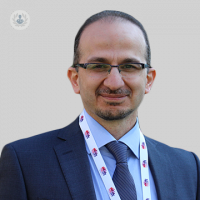Can we cure type 2 diabetes with surgery?
Autore:At the Annual Congress of the Egyptian Society of Obesity Surgery, one of London’s leading bariatric surgeons, Mr Ali Alhamdani, presented on the promises of mini-gastric bypass surgery – and the remarkable evidence that it has the potential not only to cure obesity, but type 2 diabetes as well. In our interview with Mr Alhamdani, we discussed the emerging theories behind this extraordinary link, and what this could mean for the future of diabetes treatment.

What is a mini-gastric bypass?
A mini-gastric bypass is very similar to a normal gastric bypass – both procedures aim to reduce the size of the stomach and bypass part of the small bowel, resulting in dramatic weight loss. A mini-gastric bypass makes just one joint between the bowel and stomach, as opposed to two, and the operation is shorter – typically taking just over an hour, compared to two hours in the normal gastric bypass.
There are many advantages to performing a mini-gastric bypass. Recovery is faster for the patient, and there are fewer complications such as clots, bleeding. Because there is less interference with the bowel, the risk of developing internal hernias is also reduced.
When was the link with diabetes discovered?
The discovery that surgery could cured type 2 diabetes was entirely accidental! Surgeons have been performing gastric bypass surgery since the 1950s, originally to treat stomach ulcers. They simply happened to find that those with type 2 diabetes who underwent gastric bypass surgery experienced significantly reduced glucose levels after the procedure.
These initial results have since been backed up by long-term studies which showed that even 10 years after surgery, 70-80% of patients had controlled or resolution of type 2 diabetes.

Why would a gastric bypass cure diabetes?
Even though we’ve been observing the effect for over 60 years, the truth is we still don’t know how this operation exactly works. One theory is that because the patient loses weight, the body cells’ sensitivity to insulin increases. Another theory is that gastric bypass surgery encourages the production of certain intestinal hormones, which increases the production of insulin. A third branch of thought is that the procedure interferes with the absorption of bile acids and salts and accordingly decrease the absorption of harmful sugars and carbohydrates.
But these are still emerging theories, and of course it could be multi-factorial effects of this procedure on human body metabolism.
Isn’t this a game-changer for diabetes treatment?
It is absolutely a game-changer. All of the medical treatments we have for diabetes they don’t tend to cure the disease itself but keep the symptoms partially under control. The notion that you can actually cure the condition is ground-breaking.
It’s also a game-changer when you think about it from the perspective of cost. We currently spend £3,000 - £4,000 a year treating someone with diabetes. A mini-gastric bypass costs about £8,000. If it’s successful in curing the patient of diabetes, it will pay for itself within just two years. When you consider that there are up to four million people in the UK with type 2 diabetes, that’s an enormous cost saving.
Why aren’t more people offered this treatment?
In the UK, gastric bypass surgery is already considered for anyone with a BMI over 30. But only a small proportion of eligible patients receive the treatment. Since NICE recommendations were introduced we’ve only carried out approximately 50,000 procedures in UK on patients with a BMI over 30, against a total potential patient group of four million people.
There are a number of reasons. A big hurdle is that there are simply not enough surgeons in the UK who specialise in gastric bypass surgery. Furthermore, it’s a large upfront cost which NHS England might not have the resources for.
The evidence of mini gastric bypass surgery’s effectiveness continues to build, and plenty of working parties are pushing the NHS in this direction. Overall, there are grounds for optimism that it could eventually become a key tool in our fight against the UK’s growing diabetes epidemic.


